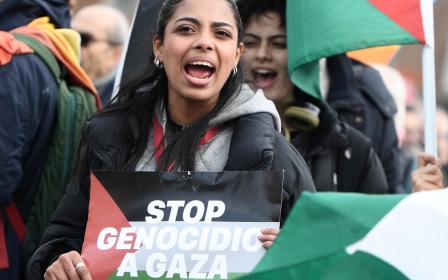Watch in full: South Africa asks ICJ to order Israel to halt Rafah offensive
South Africa asked the International Court of Justice (ICJ) on Thursday to order Israel to halt its Rafah offensive, and argued that the assault posed a risk to "the very survival of Palestinians in Gaza."
South Africa's ambassador to the Netherlands, Vusi Madonsela, asked the court in his opening remarks to "do what it can to stop the genocide," which he said had "shocked the conscience of humanity."
He added that South Africa's fourth submission to the court was triggered not only by the assault on Rafah but by an intensification of the Israeli assault across Gaza in the last few days.
South Africa's second representative, Professor Vaughan Lowe, told the ICJ that the provisional measures already issued to Israel by the court were "not effective" in protecting Palestinians against genocide, and asked the court to "reassert its own authority and the authority of international law".
He said the current Israeli offensive on Rafah is "the last step in the destruction of Gaza and its Palestinian people."
Stay informed with MEE's newsletters
Sign up to get the latest alerts, insights and analysis, starting with Turkey Unpacked
"It was Rafah that brought South Africa to the court, but it is all Palestinians - as a national ethnic and racial group - who need the protection from genocide that the court can order," he said.
Thursday's hearing at the UN's top court in The Hague is part of South Africa's broader case against Israel that accuses it of committing "acts of genocide" against Palestinians in Gaza.
Israel denies the accusation and has called South Africa's case "wholly unfounded."
In January, the court ordered Israel to ensure its troops do not commit genocidal acts against Palestinians in Gaza, allow in more humanitarian aid and preserve any evidence of violations.
However, humanitarian organisations have repeatedly lamented aid restrictions as famine stalks the enclave.
The UN's Office for the Coordination of Humanitarian Affairs (OCHA) said on Thursday that it was "nearly impossible" to distribute aid within Gaza, adding that crossings were either "closed, unsafe to access, or not logistically viable."
The ICJ, also known as the World Court, was established in 1945 to resolve disputes between states. It should not be confused with the treaty-based International Criminal Court (ICC), also in The Hague, which handles war crimes cases against individuals.
South Africa and Israel are signatories to the 1948 Genocide Convention giving the ICJ jurisdiction to rule on disputes over the treaty. While the case revolves around the Israeli-occupied Palestinian territories, Palestinians have no official role in the proceedings.
All states that signed the Genocide Convention are obliged to not commit genocide, and to prevent and punish it. The treaty defines genocide as “acts committed with intent to destroy, in whole or in part, a national, ethnical, racial or religious group."
Israel is scheduled to respond in another hearing on Friday.
Middle East Eye delivers independent and unrivalled coverage and analysis of the Middle East, North Africa and beyond. To learn more about republishing this content and the associated fees, please fill out this form. More about MEE can be found here.





